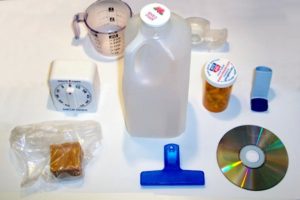
Some bad news about using recycled plastics in consumer goods . Scientists found that recycled plastics contain hundreds of toxic chemicals - everything from pesticides to pharmaceutical medicines. In other words, the chemicals the plastics were originally exposed to or made up of are still sticking around.
European researchers analyzed samples of plastic pellets (High-Density Polyethylene (HDPE) pellets) that were collected from plastics recycling facilities from countries in Europe, South America, Asia, and Africa. They found 491 chemical compounds in the plastic pellets, including pesticides, pharmaceuticals, industrial chemicals, and plastic additives. Also "forever chemicals" such as polycyclic aromatic hydrocarbons (PAHs).
The study results were especially worrisome because polyethylene is such a commonly used plastic, one that is considered OK. It's even in clear wrap used to wrap food, as well as milk and juice containers. But...keep in mind that all plastics leach chemicals even when they are "virgin" (used for the first time). Recycling plastics just adds more chemicals to them.
Very important points from the research: 1) About 13,000 chemicals are currently known to be used in the production of plastics materials and products [2].
2) Several of these chemicals have hazardous properties while thousands of the chemicals lack data, even basic toxicological data. (In other words - no one knows if these chemicals are toxic.)
3) Non-intentionally added substances may further contaminate plastics during production, when it's used, and even during the recycling process. This results in recycled plastic materials that contain unknown numbers of chemical substances in unknown concentrations.
In other words: User beware. No one is looking out for you and making sure the stuff is safe. Efforts need to be made (laws passed) that hazardous chemicals are not used in making plastics. [Researchers stressing this.]
From Science Daily: Scientists found hundreds of toxic chemicals in recycled plastics
When scientists examined pellets from recycled plastic collected in 13 countries they found hundreds of toxic chemicals, including pesticides and pharmaceuticals. Because of this, the scientists judge recycled plastics unfit for most purposes and a hinder in the attempts to create a circular economy.
In total, 491 organic compounds were detected and quantified in the pellets, with an additional 170 compounds tentatively annotated. These compounds span various classes, including pesticides, pharmaceuticals, industrial chemicals, plastic additives.
